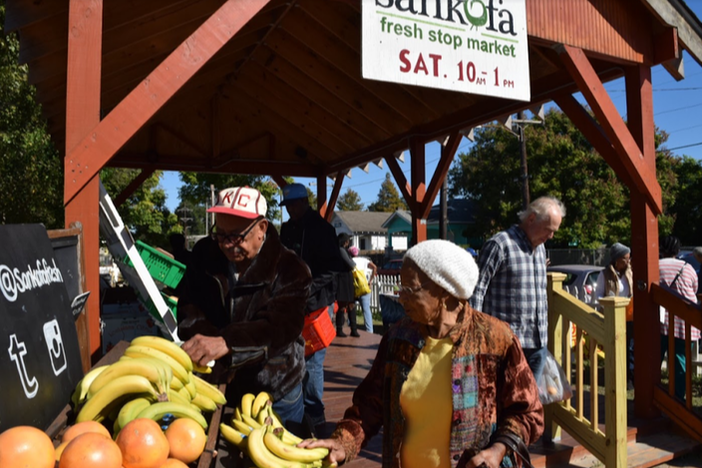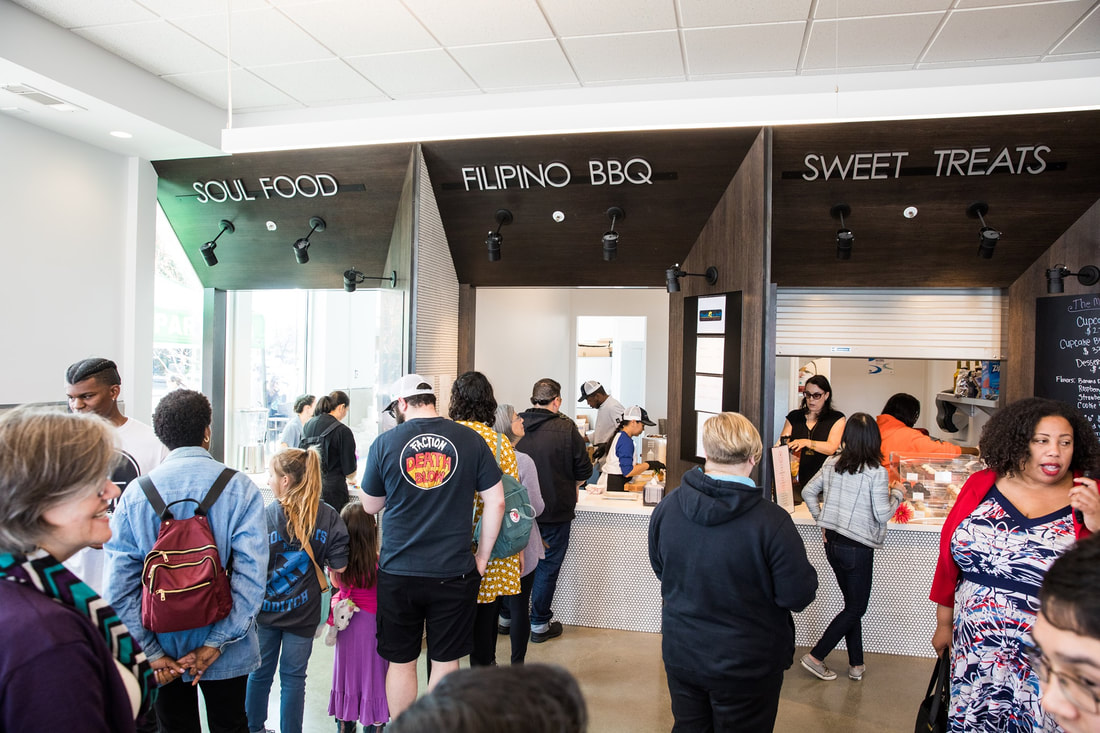Local food ventures and healthy food access projects have gained considerable traction in underserved neighborhoods in recent years. However, many of these initiatives often exclude local residents in their planning, execution, and ownership; structures that can have significant negative health and economic impacts in these communities, and even exacerbate injustices. In response, a new framework of resident-led initiatives promoting equity in community-level food systems projects is emerging.
Equitable Food Oriented Development (EFOD), is an innovative approach that aligns food and economic development models, with an explicit aim of building community power. EFOD specifically helps historically marginalized communities maintain leadership, pride, and voice in their resident-centered food and agriculture initiatives; and ensures vulnerable communities can create food systems that reflect culture, promote health, and build community wealth.
EFOD organizations around the country have long sought to explain the transformative nature of their work to audiences that still see health equity, economic opportunity, and community leadership as distinct fields of practice. Beginning in 2015, organizations began meeting to discuss a research and evaluation agenda that would uplift the creation of community-led, food-based economies. Supported by visionary philanthropic leaders who saw the connection between community ownership and the success of place-based public health and economic initiatives, a formal group began to emerge - The EFOD Collaborative and Steering Committee.
Equitable Food Oriented Development (EFOD), is an innovative approach that aligns food and economic development models, with an explicit aim of building community power. EFOD specifically helps historically marginalized communities maintain leadership, pride, and voice in their resident-centered food and agriculture initiatives; and ensures vulnerable communities can create food systems that reflect culture, promote health, and build community wealth.
EFOD organizations around the country have long sought to explain the transformative nature of their work to audiences that still see health equity, economic opportunity, and community leadership as distinct fields of practice. Beginning in 2015, organizations began meeting to discuss a research and evaluation agenda that would uplift the creation of community-led, food-based economies. Supported by visionary philanthropic leaders who saw the connection between community ownership and the success of place-based public health and economic initiatives, a formal group began to emerge - The EFOD Collaborative and Steering Committee.
Sankofa CDC - New Orleans, Louisiana, EFOD Steering Committee Member
The origins of the term “Equitable Food Oriented Development,” and the desire to articulate the vision of organizations using such a framework, reflects the importance of co-creation between practitioners and key allies in the health and development fields. After several months of EFOD Steering Committee meetings, research and drafting by DAISA, and building upon a white paper written by Dana Harvey, the following working definition of the EFOD practice was co-developed:
Equitable Food Oriented Development is a development strategy that uses food and agriculture to create economic opportunities, healthy communities, and explicitly seeks to build community assets, pride, and power by and with historically-marginalized communities.
In October 2019, the EFOD Collaborative along with DAISA, and with support from The Kresge Foundation, released Equitable Food Oriented Development: Building Community Power - a white paper based on fresh, new research that lays out the EFOD framework - its origins, defining criteria, and impacts. The paper also provides well-researched recommendations for sustainable field-building developed from years of community-based practitioner expertise.
Impacts and outcomes attributed to EFOD are distinct from those of traditional community development or food oriented development (FOD). While conventional food systems work may unintentionally cause harm to communities through gentrification, displacement, or extraction of local resources, EFOD instead fosters strong social capital networks, equitable asset development, increased civic engagement, and decreased displacement.
EFOD IN ACTION: THE POWER OF FOOD-BASED COMMUNITY DEVELOPMENT
Ashland Market & Cafe, a project of Mandela Partners (Oakland, CA)
“It was a very focused effort to work with community to determine food access gaps and economic development opportunities… through that process we were not only able to launch a community-directed project, but we also deepened our own connection with the neighborhood we serve.”
- Mariela Cedeño, Interim Executive Director, Mandela Partners
Long-time community organization Mandela Partners worked alongside local residents and stakeholders to develop the Ashland Market and Cafe, a 2,100-square-foot food hall, incubator, and community space on the ground floor of an affordable housing complex. The project was catalyzed in partnership with a resident-led advisory committee that eventually selected four local food entrepreneurs as the facility’s inaugural tenants. Ashland Market & Cafe vendors live in the surrounding neighborhoods and sell foods that reflect their heritage and family histories. To support and encourage community-based entrepreneurship, kiosks rental rates are kept well below market and tenants are offered business development workshops, micro-loans, and legal assistance. Ashland Market & Cafe was funded using an innovative, but cumbersome, mix of financial instruments including revolving loans, $360,000 in federal Healthy Food Financing Initiative funds, and $1.3M in public and private investments.
Equitable Food Oriented Development is a development strategy that uses food and agriculture to create economic opportunities, healthy communities, and explicitly seeks to build community assets, pride, and power by and with historically-marginalized communities.
In October 2019, the EFOD Collaborative along with DAISA, and with support from The Kresge Foundation, released Equitable Food Oriented Development: Building Community Power - a white paper based on fresh, new research that lays out the EFOD framework - its origins, defining criteria, and impacts. The paper also provides well-researched recommendations for sustainable field-building developed from years of community-based practitioner expertise.
Impacts and outcomes attributed to EFOD are distinct from those of traditional community development or food oriented development (FOD). While conventional food systems work may unintentionally cause harm to communities through gentrification, displacement, or extraction of local resources, EFOD instead fosters strong social capital networks, equitable asset development, increased civic engagement, and decreased displacement.
EFOD IN ACTION: THE POWER OF FOOD-BASED COMMUNITY DEVELOPMENT
Ashland Market & Cafe, a project of Mandela Partners (Oakland, CA)
“It was a very focused effort to work with community to determine food access gaps and economic development opportunities… through that process we were not only able to launch a community-directed project, but we also deepened our own connection with the neighborhood we serve.”
- Mariela Cedeño, Interim Executive Director, Mandela Partners
Long-time community organization Mandela Partners worked alongside local residents and stakeholders to develop the Ashland Market and Cafe, a 2,100-square-foot food hall, incubator, and community space on the ground floor of an affordable housing complex. The project was catalyzed in partnership with a resident-led advisory committee that eventually selected four local food entrepreneurs as the facility’s inaugural tenants. Ashland Market & Cafe vendors live in the surrounding neighborhoods and sell foods that reflect their heritage and family histories. To support and encourage community-based entrepreneurship, kiosks rental rates are kept well below market and tenants are offered business development workshops, micro-loans, and legal assistance. Ashland Market & Cafe was funded using an innovative, but cumbersome, mix of financial instruments including revolving loans, $360,000 in federal Healthy Food Financing Initiative funds, and $1.3M in public and private investments.
Ashland Market & Cafe, Mandela Partners - Oakland, California, EFOD Steering Committee Member
TAKE ACTION
Read the white paper and share it with your networks.
Visit EFOD.org to learn more about Equitable Food Oriented Development and the EFOD Collaborative.
Join the EFOD mailing list to stay up-to-date on happenings in the field.
The white paper was jointly produced by the EFOD Collaborative and DAISA Enterprises, with support from The Kresge Foundation. EFOD Collaborative Steering Committee members include Community Services Unlimited Inc., Nuestras Raíces, La Mujer Obrera, Mandela Partners, Detroit Black Community Food Security Network, Inclusive Action for the City, Planting Justice, Sankofa Community Development Corporation, La Semilla Food Center, and allies from Capital Impact Partners, Self-Help Federal Credit Union, and The Wallace Center at Winrock International.
TAKE ACTION
Read the white paper and share it with your networks.
Visit EFOD.org to learn more about Equitable Food Oriented Development and the EFOD Collaborative.
Join the EFOD mailing list to stay up-to-date on happenings in the field.
The white paper was jointly produced by the EFOD Collaborative and DAISA Enterprises, with support from The Kresge Foundation. EFOD Collaborative Steering Committee members include Community Services Unlimited Inc., Nuestras Raíces, La Mujer Obrera, Mandela Partners, Detroit Black Community Food Security Network, Inclusive Action for the City, Planting Justice, Sankofa Community Development Corporation, La Semilla Food Center, and allies from Capital Impact Partners, Self-Help Federal Credit Union, and The Wallace Center at Winrock International.


 RSS Feed
RSS Feed